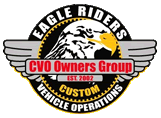Spiderman, you may not own a shop,however sounds like you really have a educated take on the subject !!!
I think that I found a decent engine builder/machinist/dyno guy in my state.
I am expecting my new FLHXSE2 any day now.Thanks to you folks on this site I realized early to go outside of the Dealership for my engine build. Yeh I know it's a new big, one I always wanted and decided to Stage III right out of the box.
To keep it brief, I met with the Engine builder and we are going to punch the jugs ten over, 10:5 pistons, polish the heads, change stock AC to a bigger K&N filter, TTS Master Tuner with a V&H 2-1 High Output pipe.
He has a good tuner rep. Has two dynos on site.
SORRY: for going on, MY Question is to you and anybody that wants to put in,CAMS, what cam would work best in the 110 to produce those low end high numbers that you spoke of with my build ? it's either ask now or live with a bad decision for awhile. ~THANKS TO ALL THAT HAVE BEEN A GREAT HELP~
 Author
Topic: Deciphering Dyno Numbers? (Read 12308 times)
Author
Topic: Deciphering Dyno Numbers? (Read 12308 times)

